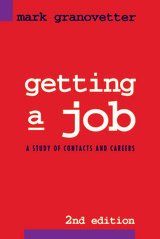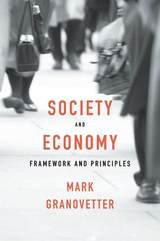
This second edition is updated with a new Afterword and includes Granovetter's influential article "Economic Action and Social Structure: The Problems of Embeddedness."
"Who would imagine that a book with such a prosaic title as 'getting a job' could pose such provocative questions about social structure and even social policy? In a remarkably ingenious and deceptively simple analysis of data gathered from a carefully designed sample of professional, technical, and managerial employees . . . Granovetter manages to raise a number of critical issues for the economic theory of labor markets as well as for theories of social structure by exploiting the emerging 'social network' perspective."—Edward O. Laumann, American Journal of Sociology
"This short volume has much to offer readers of many disciplines. . . . Granovetter demonstrates ingenuity in his design and collection of data."—Jacob Siegel, Monthly Labor Review
"A fascinating exploration, for Granovetter's principal interest lies in utilizing sociological theory and method to ascertain the nature of the linkages through which labor market information is transmitted by 'friends and relatives.'"—Herbert Parnes, Industrial and Labor Relations Review

Getting a job, or changing from one job to another, is usually of interest only to the people directly involved. Mark Granovetter sees it differently, however, and so will his readers. He provides for the first time a detailed account and analysis of how professionals are channeled into high-level jobs. It is friends, and sometimes relatives, who provide the crucial information and contacts. This does not seem surprising in any individual case but it is often denied in the aggregate.
Granovetter also explores the nature of the relation between job-changer and his contact, and gives systematic attention to the problem of why some individuals have the "right" contacts while others do not. He traces the way job information moves from the employer who has a vacancy to the man who ultimately fills it, and discusses the factors that influence the transmission of the information. In conclusion he considers the impact of these factors on career patterns, organizational structure, and "affirmative action" programs.

Society and Economy—a work of exceptional ambition by the founder of modern economic sociology—is the first full account of Mark Granovetter’s ideas about the diverse ways in which society and economy are intertwined.
The economy is not a sphere separate from other human activities, Granovetter writes. It is deeply embedded in social relations and subject to the same emotions, ideas, and constraints as religion, science, politics, or law. While some actions can be understood in traditional economic terms as people working rationally toward well-defined ends, much human behavior is harder to fit into that simple framework. Actors sometimes follow social norms with a passionate faith in their appropriateness, and at other times they conform without conscious thought. They also trust others when there is no obvious reason to do so. The power individuals wield over one another can have a major impact on economic outcomes, even when that power arises from noneconomic sources.
Although people depend on social norms, culture, trust, and power to solve problems, the guidance these offer is often murky and complicated. Granovetter explores how problem solvers improvise to assemble pragmatic solutions from this multitude of principles. He draws throughout on arguments from psychology, social network studies, and long-term historical and political analysis and suggests ways to maneuver back and forth among these approaches. Underlying Granovetter’s arguments is an attempt to move beyond such simple dualisms as agency/structure to a more complex and subtle appreciation of the nuances and dynamics that drive social and economic life.
READERS
Browse our collection.
PUBLISHERS
See BiblioVault's publisher services.
STUDENT SERVICES
Files for college accessibility offices.
UChicago Accessibility Resources
home | accessibility | search | about | contact us
BiblioVault ® 2001 - 2024
The University of Chicago Press









